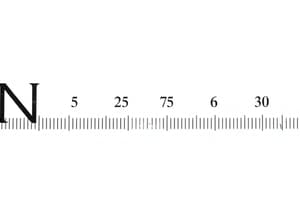Podcast
Questions and Answers
What is a measurement?
What is a measurement?
- An estimated guess
- Only a number
- A quantitative description that includes both a number and a unit (correct)
- A qualitative description
What is scientific notation?
What is scientific notation?
An expression of numbers in the form m x 10ⁿ, where m is equal to or greater than 1 and less than 10, and n is an integer.
What does accuracy refer to?
What does accuracy refer to?
The closeness of a measurement to the true value of what is being measured.
What is precision?
What is precision?
What is the accepted value?
What is the accepted value?
What is an experimental value?
What is an experimental value?
What is an error?
What is an error?
What does percent error indicate?
What does percent error indicate?
What are significant figures?
What are significant figures?
What is the international system of units (SI)?
What is the international system of units (SI)?
What is a meter (m)?
What is a meter (m)?
What is a liter (L)?
What is a liter (L)?
What is a kilogram (kg)?
What is a kilogram (kg)?
What is weight?
What is weight?
What does temperature measure?
What does temperature measure?
What is the Celsius scale?
What is the Celsius scale?
What is absolute zero?
What is absolute zero?
What is energy?
What is energy?
What is a joule (J)?
What is a joule (J)?
What is a calorie (cal)?
What is a calorie (cal)?
What is a gram?
What is a gram?
What is the Kelvin scale?
What is the Kelvin scale?
What is a conversion factor?
What is a conversion factor?
What is dimensional analysis?
What is dimensional analysis?
What is density?
What is density?
Flashcards are hidden until you start studying
Study Notes
Measurement and Scientific Concepts
- Measurement involves a quantitative description that includes both a number and a unit, crucial for clarity in scientific communication.
- Scientific notation simplifies expressing large or small numbers in the format m x 10ⁿ, where m is between 1 and 10, and n is an integer.
- Accuracy refers to how closely a measurement reflects the true value, indicating the validity of the experimental results.
- Precision describes the consistency and reproducibility of repeated measurements, highlighting reliability in experimental methods.
Values and Errors
- Accepted value represents a consensus figure established by the scientific community for a measurement.
- Experimental value is the result obtained from an experiment, which may differ from the accepted value.
- Error is the calculated difference between the accepted value and the experimental value, providing insights into measurement validity.
- Percent error quantifies the discrepancy of a measured value from the accepted value as a percentage, aiding in evaluating accuracy.
Significant Figures and Units
- Significant figures encapsulate all known digits in a measurement, including one estimated digit, reflecting precision in reporting.
- The International System of Units (SI) is the standardized system of measurement adopted globally, promoting uniformity in scientific communication.
Fundamental SI Units
- Meter (m) is the base unit of length in SI.
- Liter (L) serves as the common metric unit of volume.
- Kilogram (kg), defined by the mass of 1 L of water at 4°C, is the base unit of mass in SI.
- Weight measures gravitational pull on an object's mass, expressed as a force.
- Temperature gauges the average kinetic energy of particles, affecting heat transfer direction.
Temperature Scales
- The Celsius scale defines water's freezing point at 0°C and boiling point at 100°C.
- Absolute zero, 0 K on the Kelvin scale, equals -273.15°C, marking the lowest possible temperature.
Energy and Units
- Energy is the capacity to perform work or generate heat, an essential component of physical processes.
- Joule (J) is the SI unit of energy, closely related to calories.
- Calorie (cal) refers to the heat required to raise the temperature of 1 g of water by 1°C.
Mass and Density
- Gram is the metric mass unit equivalent to the mass of 1 cm³ of water at 4°C, commonly used in scientific contexts.
- Density is defined as the ratio of mass to volume, a key property for identifying substances and understanding physical changes.
Conversion Techniques
- A conversion factor is a ratio utilized to change a measurement from one unit to another, essential for calculations in different contexts.
- Dimensional analysis is a problem-solving technique that incorporates units involved in a measurement, facilitating unit conversions and ensuring dimensional consistency.
Studying That Suits You
Use AI to generate personalized quizzes and flashcards to suit your learning preferences.




